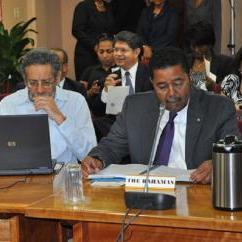
The Pan Caribbean Partnership against HIV and AIDS (PANCAP) must vigorously promote the cause of elimination of HIV as a public health threat in the Caribbean Region.
This was the view of Guyana’s Minister of Health and Chair of the Executive Board of PANCAP, the Hon. Dr. Leslie Ramsammy, who delivered the feature address at the formal opening of the Board’s 16th Ordinary Meeting on Tuesday at Caricom a Secretariat Headquarters, Georgetown, Guyana . The Meeting took place from 29 - 30 March.
“We must work towards a trajectory of long, healthy and productive lives for our citizens. We must reject, therefore, the notion that the most realistic and attainable goal is to pursue only a trajectory of reduction, as this would mean accepting the continued tragedy of children born with HIV and too many dreams, hopes and aspirations shattered,” Dr. Ramsammy urged.
Dr. Ramsammy offered some guidance to PANCAP as it entered its second decade of existence and suggested that the Partnership address ten priority areas, among others, which include:
Reduced sexual transmission of HIV;
Prevent mothers from dying and babies from becoming infected with HIV;
Ensure persons living with HIV receive treatment;
Prevent persons living with HIV from dying of Tuberculosis;
Promote harm reduction and demand reduction;
Empower men who have sex with Men (MSM) and transgender persons to protect themselves and gain universal access to prevention, treatment and care services;
Remove punitive laws, policies, practices, stigma and discrimination that block effective responses to HIV;
Meet the needs of women and girls and stop sexual and gender-based violence;
Empower young people to protect themselves from HIV; and,
Enhance social protection for people affected by HIV.
Ms. Myrna Bernard, Officer-in-Charge, Human and Social Development, CARICOM Secretariat highlighted some of PANCAP’s achievements over the last ten years. She noted that these successes and others have contributed significantly to the gains that have been made in the Region’s response to HIV and AIDS.
However, she warned that despite these gains, there were challenges that still confront the region. “Prevention programmes are still not reaching the most at-risk populations and stigma and discrimination remain major obstacles, while many of our organisations of persons living with HIV are struggling to survive” Ms. Bernard pointed out.
Alluding to the significantly changed resource landscape, Ms. Bernard noted that resource mobilisation has become increasingly more difficult as the world grappled with the global financial crisis. She explained that with the majority of Caribbean countries not being eligible for funding from the Global Fund to Fight AIDS, Tuberculosis and Malaria (GFATM) and most traditional donors not being involved in HIV and AIDS, it is expected that resources are going to be hard to come by. She urged the Executive Board of PANCAP to make the money work by the efficient use of funds.
The meeting will, among other issues, discuss the main proposals and outcomes of the 10th Annual General Meeting (AGM). This includes elements of the Conference Resolution: elimination of mother-to-child transmission and travel restrictions of persons living with HIV, by 2015; increasing by 80 per cent access to care and treatment; decreasing by 50 per cent the number of new infections; and accelerating the human rights agenda.
The Executive Board of PANCAP, formerly known as the Regional Coordinating Mechanism (RCM) is responsible for providing policy guidance on the effective management and operation of the partnership and approving and directing all PANCAP projects. PANCAP, established in 2001, is the regional mechanism responsible for coordinating the Caribbean’s response to the HIV and AIDS epidemic.
»
- Login to post comments


Recent comments
9 years 2 weeks ago
9 years 22 weeks ago
9 years 26 weeks ago
9 years 30 weeks ago
9 years 31 weeks ago
11 years 49 weeks ago
12 years 11 weeks ago
12 years 31 weeks ago